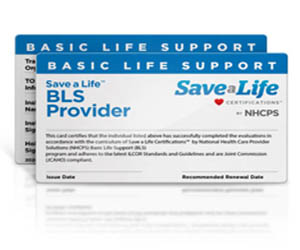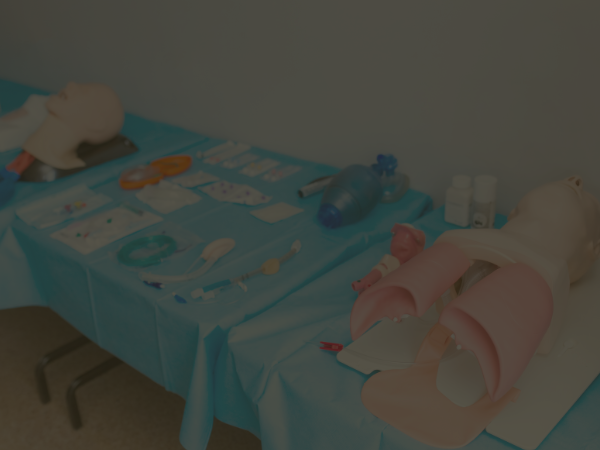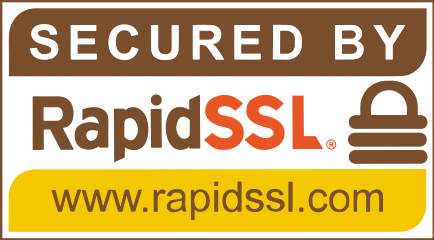The health care field is facing a crisis. Nursing continues to battle a shortage of skilled workers, reports the AACNNursing.org, which has driven increased demand for entry-level positions, like Certified Nursing Assistants (CNAs), Certified Medical Assistants (CMAs), and assistants or orderlies for virtually any care setting. However, entry-level positions often require the completion of an accredited course of study. While this course of study is not as intense or as long as nursing school, it is important to understand how someone interested in health care can use these positions to decide their future. This may include the completion of an appropriate program, such as Basic Life Support (BLS) certification, as well additional courses for unlicensed staff.
As explained by the U.S. Department of Labor, the job outlook for entry-level positions, including nursing assistants and orderlies, is expected to grow “much faster than average” at 11 percent. Since these positions do not routinely require work experience prior to employment, those interested in entry-level positions need to know a few things about the value of completing additional coursework, how to make their skills attractive, find the right programs and land the right position.
BLS Certification Is the First Step in Pursuing a Health Care Career

Obtaining a BLS and CPR Certification is among the easiest ways to begin the coursework necessary for entry-level nursing. These certifications include the most recent medical guidelines and provide individuals with the skills necessary to respond to someone in medical distress. Unlike other forms of life support, such as Advanced Cardiac Life Support (ACLS), BLS training is available and useful for anyone, even those without experience in the field. While it still may be useful to obtain an ACLS certification at some point in your career, a BLS certification gives you the edge needed to succeed before your career even begins.
Individuals seeking to become full-fledged, licensed nurses should also consider completing a BLS course or program of study prior to applying for a nursing program. In some cases, completing a BLS program may be necessary for all applicants before admission. However, instructors may allow students to complete the program after nursing school begins, provided it is finished prior to beginning clinicals.
Clinicals refer to the in-facility training that accompanies in-classroom instruction for health care careers, including Registered Nurses (RNs), CNAs and CMAs. The simplest way to think of clinicals is as the lab accompaniment to health care training. While clinicals offer an opportunity to determine care-floor preferences, experience in clinicals can be somewhat limited. This is why more people opt to pursue entry-level careers before and during nursing school. Entry-level positions offer an opportunity to see what everyday activities are like across multiple units and care settings, depending on employer-assigned duties.
What About CPR Training
Obtaining a BLS certification may not necessarily be required for employment in health care settings. For instance, skilled nursing facilities, otherwise known as “nursing homes,” may employ individuals that are not BLS-certified. Minimum requirements may range from completion of an entry-level nursing program or a commitment to complete a facility-sponsored entry-level nursing program.
In other words, some entry-level employers may allow applicants to complete coursework at their facility in exchange for a commitment to work at the facility for a predetermined duration or other incentive. Even in such cases, CPR certification is a minimum requirement.
Why BLS-Certified Applicants Stand Apart in Entry-Level Nursing

Although being CPR-certified is enough for some entry-level positions, it can be difficult to understand why it would be necessary or beneficial for others. BLS-certified employees demonstrate their determination to go beyond minimum requirements to help others.
This is a key trait of successful nursing students; they are willing to put in the additional work necessary to make their skills more valuable. Furthermore, some facilities may allow CNA students to begin work prior to completing the course, provided a predetermined amount of in-classroom study has been completed. The specific amount of coursework necessary varies by state.
BLS-certified applicants also have an added advantage when it comes time to renew their entry-level career certifications. For CNAs, the typical renewal deadline is every two years. In Texas, CNAs must complete a minimum of 24 hours of continuing education for renewal eligibility, asserts the Texas Department of Health and Human Services. Depending on existing CEUs offered at a facility, BLS certification may count toward this renewal. However, it is imperative entry-level employees follow up with their supervisor or education coordinator to ensure they have met all necessary CEU requirements to maintain their certification.
How to Find the Right BLS Program for You
Finding the BLS program can be another challenge. Course providers exist in every corner of the country and through multiple online platforms. Instead of choosing the first provider available, consider following these steps to find the right program for you:
- Consider your schedule. This is the most important step in finding a BLS or other health care-oriented program. It must work with your schedule. If schedule conflicts arise, an online program may be the best solution.
- Take advantage of mobile technology. Modern BLS programs, which typically can be completed in a single setting, leverage mobile technology to make training easier and more effective. Instead of waiting for computer access or trying to complete BLS training in a facility, mobile technology may be another viable solution.
- Ask potential employers about employer-paid training. Companies that offer BLS training also have a vested interest in keeping more employees certified. Therefore, they may offer discounts to employees of certain organizations, like major hospitals, or employers may offer paid training or reimbursement.
- Complete the course. It sounds repetitive, but finding a program is only one-half of the battle. You still need to complete the course, so it is best to block out a time to sit and complete the program where you will be free of distractions.
Additional Tips for Success in Entry-Level Nursing
There are countless ways to succeed in entry-level nursing, and they are valuable when applying for a position, completing an interview, shadowing existing staff or simply inquiring whether a facility is hiring. Since the right steps can make the difference between landing a right job and an “okay” position, those interested in a health care field should follow these tips:
- Complete a State-Approved Education Program. Enrolling in and completing an approved education program for a specific form of entry-level nursing should be the top priority. However, those interested in entry-level nursing should consider contacting care facilities in their area to determine if employer-paid programs are available. This can be a great help if financial aid is otherwise unavailable.
- Complete Your Background Checks. The healthcare field involves knowing some of the most intimate and personal details of those in need of care. Furthermore, the vulnerabilities of patients can be taken advantage of, so healthcare careers involve the completion of a background check, which may be a federal background check, depending on employer and program of study.
- Consider Pursuing Additional Skills Before Applying. As noted above, entry-level applicants can make their applications more attractive to potential employers by pursuing additional certifications and CEU’s prior to applying. Additional skills and courses to take may include first-aid, emergency preparedness, BLS certification, dementia care and more.
- Practice Communication Skills. Strong communication skills are essential to success in healthcare. It is not enough to simply be able to speak clearly; those interested in this career need to be able to communicate with individuals of different mental status and with different types of impairments, such as the visually or hearing impaired.
- Demonstrate Empathy. This is among the hardest tips to follow. Those interested in healthcare must have compassion and empathy. This is not a skill that can be taught; it must simply come from the heart. Primarily, put the feelings and emotions of others ahead of yourself.
- Be Patient. There will be dozens of times when your patience will be tested. The sick and tired of society have little patience, and they can become demanding without notice. Think about it; when you are sick, are you the most agreeable person? Those in your care will expect you to help them feel better, so you must be patient and willing to help as much as you can in your current position.
- Eat Healthy, and Exercise. This is a great tip for any career, but it holds a special place in healthcare. In addition to leading by example for those in your care, eating healthy and exercising is essential to being able to perform the basic job duties of entry-level positions. For example, CNAs may spend entire shifts on their feet and moving individuals between chairs, beds and other places. Physical endurance is essential to being successful in entry-level care
- Broaden Experience With Multiple Care Settings. Those in entry-level positions have an opportunity to explore multiple care facilities and the units. Instead of focusing on working in a single unit, consider expanding your skills across different settings. For example, spend several months working on a Medical-Surgical floor, and moved to a new unit to learn new skills, if allowed by your employer.
- Complete CEUs. The overseeing agency for your specific type of entry-level position, such as the Department of Aging and Disability Services (DADS) in Texas for CNAs, reports HHS.Texas.gov, may offer free CEUs, but most employers also offer CEUs at little to no cost for employees. Take advantage of his many CEUs as may be offered in your facility and for your specific position.
- Remember the Value and Legality of PHI and HIPAA. Violating the Health Insurance Portability and Accountability Act (HIPAA) carries a set of stiff penalties, ranging from facility fines and penalties to penalties assessed and placed upon the individual that violated the law.
- Work Each Shift Like It Is a Course-Examination. In healthcare, it is easy to cut corners when an instructor or governing agency is not watching your actions. There will always be added pressure to get your duties finished faster and without impairing the quality of services provided. As a result, treat every shift and action like it is key to passing an exam in school. Imagine the nurse-examiner standing next to you every day. This will help build your skills without cutting corners. For CNAs, minor issues, like tossing dirty linens to the floor, can spread illnesses and pathogens throughout a facility. The proper protocol is to place soiled linens in an appropriate bag, such as the hazardous materials and linens bag.
- Learn From the Experience of Others. A healthcare career will present numerous learning possibilities, and learning from the experience of others in your facility can be one of the most effective ways to refine your skills and learn more about the field. If you do not know something, ask, and chances are good that the person you ask will be more than happy to show you what you need to know.
- Inquire Supervisors About Letters of Recommendation. Obtaining letters of recommendation is a key step for many nursing school applications, and since entry-level positions provide a first-glimpse of nursing, your coworkers and supervisors are the best source for such letters. Although this is not necessary in your current role, it will be a great help for future employment and educational opportunities.
- Enroll in an Accredited Nursing School When You Feel Ready. If you choose to pursue nursing, medicine, or another higher-level healthcare career, it is important to enroll and apply when you fill ready. It is okay to feel anxious and nervous, but make sure you understand how additional schooling will affect your work and personal life. Remember it is never too late to further your education.
Enter the Health Care Field With the Right Credentials Now
A health care career, including entry-level nursing, is an amazing way to make a difference in the lives of countless people. Although nursing school can be a start to entering this field, some opt to enter their careers as a CNA, CMA or other form of entry-level care. For those with limited experience or uncertainty if a health care career is right for them, the easiest way to get started is by understanding the career requirements and following these tips.
If you haven’t already, sign up for your life-saving skills certification with an accredited institution, and share this post to social media. It’s your life and opportunity to help others, so make your skills in-demand with the right training today.







Gm sir….I’m neelam from lahore I would like to renew my bls certificate I wanted to know when next training will start plz reply me asap..thanks with regards